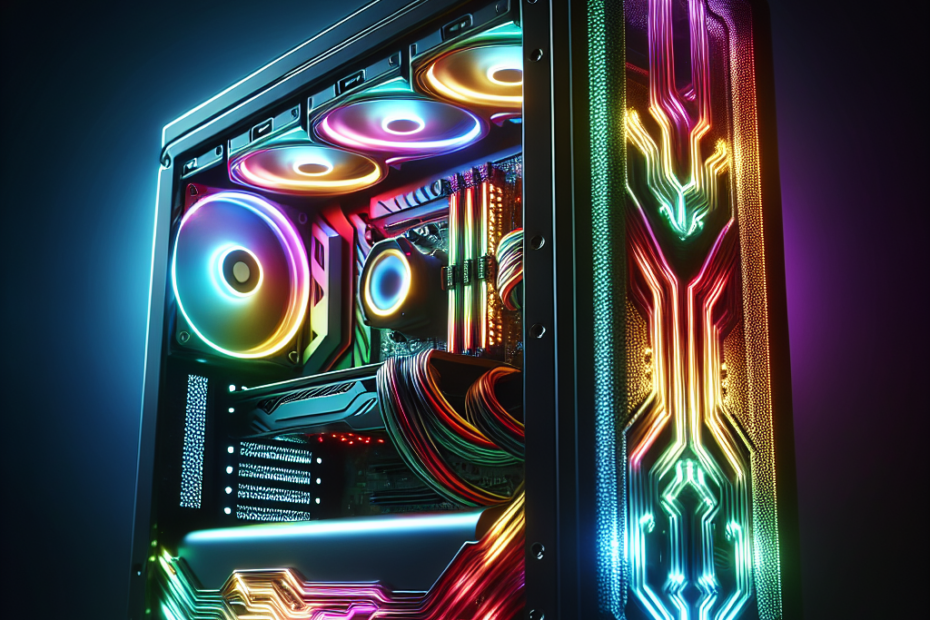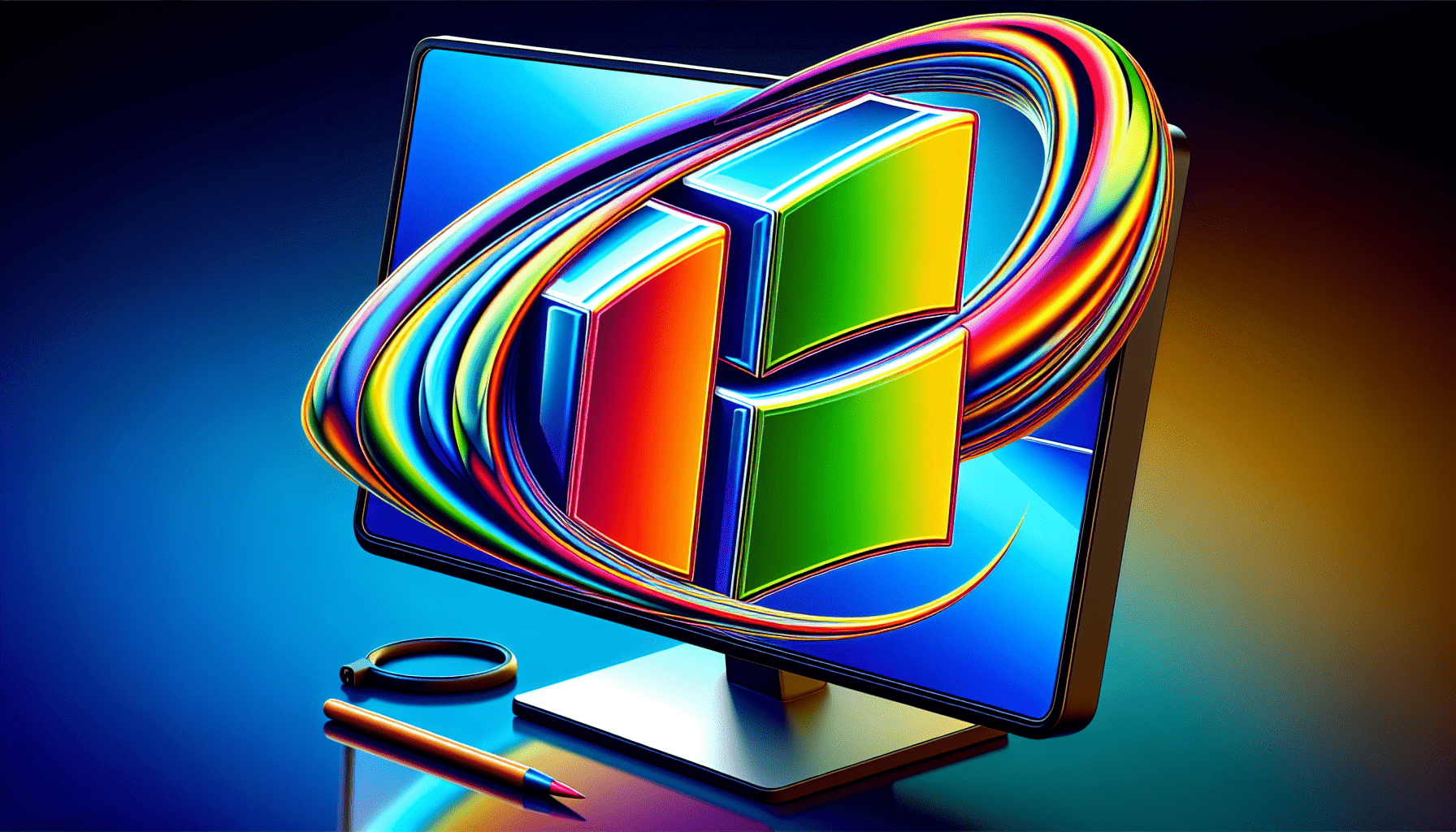







In the eternal battle of gaming supremacy, there is one question that has been debated by gamers for ages: What’s better for gaming, a gaming PC or gaming laptop? Gamers of all types have their preferences, with some swearing by the power and customization options of a gaming PC, while others appreciate the portability and convenience of a gaming laptop. But which one truly reigns supreme in the world of gaming? Let’s explore the pros and cons of each, allowing you to make an informed decision that will level up your gaming experience.

Understanding the Basics
Definition of a Gaming PC
A gaming PC, also known as a gaming desktop, is a computer specifically designed and optimized for gaming purposes. It consists of various components, including a powerful processor, a high-performance graphics card, ample RAM, and sufficient storage capacity. These components work together to deliver exceptional gaming performance and an immersive gaming experience. Gaming PCs often come with additional features such as LED lighting, advanced cooling systems, and customizable design options.
Definition of a Gaming Laptop
A gaming laptop, on the other hand, is a portable version of a gaming PC. It shares many similarities with a gaming desktop in terms of hardware specifications, but with the advantage of mobility. Gaming laptops are designed to provide a comparable gaming experience to that of a gaming desktop, while allowing gamers to enjoy their favorite games on the go. They are equipped with powerful processors, high-quality graphics cards, ample RAM, and fast storage options.
Key Features of a Gaming PC & Laptop
Both gaming PCs and gaming laptops have certain key features that differentiate them from regular computers. One of the most important features is the powerful processor, which determines the overall speed and performance of the system. The graphics card is another crucial element, responsible for rendering high-quality graphics and delivering smooth gameplay. Additionally, the amount of RAM plays a significant role in multitasking and overall system performance. The storage capacity, whether in the form of a Solid State Drive (SSD) or a Hard Disk Drive (HDD), is also important for storing games and other data. Other notable features include the display quality, audio capabilities, and cooling systems to manage heat.
Performance Analysis
Processor Performance Comparison
When it comes to gaming performance, the processor is a vital component. It affects how quickly the computer can process data and execute commands. Gaming PCs generally have more powerful processors compared to gaming laptops due to the limitations of size and cooling in laptops. They often feature high-end desktop processors, which have a greater number of cores and higher clock speeds. This allows gaming PCs to handle more demanding games and perform tasks such as video editing and streaming simultaneously without significant performance drops. However, advancements in laptop processors, such as Intel’s i7 and i9 series and AMD’s Ryzen series, have bridged the gap to some extent, providing gaming laptops with impressive processing power.
Graphics Card Performance Comparison
The graphics card, or GPU, is perhaps the most critical component for gaming. It determines the visual quality and performance of games by rendering and displaying images on the screen. In general, gaming PCs tend to offer more powerful graphics cards compared to gaming laptops. They often boast high-end graphics cards from brands like Nvidia and AMD, which provide superior performance and support for features like ray tracing. These powerful GPUs enable gaming PCs to handle graphically intensive games at higher resolutions and frame rates, resulting in a more immersive gaming experience. While gaming laptops also come equipped with dedicated graphics cards, they are usually not as powerful as their desktop counterparts due to size and cooling constraints.
RAM and SSD Capacity Comparison
RAM (Random Access Memory) and storage capacity are other essential factors when it comes to gaming performance. Gaming PCs typically offer higher RAM capacities, starting from 16GB and going up to 64GB or even higher in some cases. This allows for smoother multitasking and faster loading times in games. In contrast, gaming laptops usually come with a lower RAM capacity, typically ranging from 8GB to 32GB. Similarly, when it comes to storage, gaming PCs often provide larger capacities, including options for both SSDs and HDDs. SSDs are preferred for faster game load times, while HDDs offer larger storage capacities at a lower cost. Gaming laptops usually prioritize SSDs for faster performance, but the storage capacity tends to be more limited.
Portability
Ease of Movement with Gaming Laptops
One of the primary advantages of gaming laptops is their portability. They are designed to be compact and lightweight, making them easy to carry around. Whether you are traveling, visiting a friend’s house, or attending a gaming event, a gaming laptop allows you to play your favorite games wherever you go. With a gaming laptop, you have the flexibility to enjoy uninterrupted gaming sessions regardless of your location.
Stationary Nature of Gaming PCs
On the other hand, gaming PCs are stationary by nature. They are typically set up in a dedicated space, such as a gaming room or office, and are not designed to be easily moved around. Gaming PCs require a stable desk or table along with proper cable management, which may not be suitable for those who prefer to change locations frequently or have limited space in their living environment. However, the stationary nature of gaming PCs also means that they can be more stable and secure, with less risk of accidental damage caused by moving or transportation.
Gaming on the Go: Laptops vs Desktops
When it comes to gaming on the go, gaming laptops offer the ultimate convenience. They allow you to take your gaming setup with you wherever you want, whether it’s a long journey or a short trip. Gaming laptops also offer the advantage of instant gaming, as they don’t require any external display, keyboard, or mouse to be connected. Simply open the laptop and you’re ready to play. Gaming PCs, on the other hand, require additional components such as a monitor, keyboard, and mouse, making them less ideal for gaming on the go. However, if you prioritize a larger screen size, high refresh rates, and the ability to connect to multiple displays, a gaming PC might be the better choice.
Upgradeability
Easy Upgrade Options for PC
One of the significant advantages of gaming PCs over gaming laptops is the ease of upgradeability. Gaming PCs offer more flexibility when it comes to upgrading individual components. If you feel the need for more processing power, you can easily upgrade the processor. Likewise, if you want to enhance your gaming experience with a better graphics card, you can swap it out with a newer model. Additionally, upgrading RAM and storage in a gaming PC is relatively simple and cost-effective. This ability to upgrade individual components allows gaming PC owners to keep their systems up to date with the latest technology and extend their lifespan without having to invest in an entirely new system.
Limited Upgradeability of Gaming Laptops
In contrast, gaming laptops have limited upgrade options due to their compact design and integrated components. Typically, the processor and graphics card in a gaming laptop are soldered into the motherboard, making them difficult or impossible to upgrade. While some high-end gaming laptops do offer certain upgrade options, such as adding more RAM or swapping out storage drives, these options are limited compared to their desktop counterparts. It’s essential to carefully consider your anticipated future needs when purchasing a gaming laptop, as you may have to rely on external options like external graphics card enclosures or external storage options for upgrading.
Costs Associated with Upgrades
It’s important to note that while gaming PC upgrades offer more flexibility, they can come with additional costs. Upgrading individual components means investing in new parts, which can add up over time. However, upgrading your gaming PC gradually and selectively might be more cost-effective than purchasing a new system altogether. On the other hand, due to the limited upgradeability of gaming laptops, any significant performance improvements usually require investing in a new laptop entirely. This can result in more significant upfront costs compared to upgrading a gaming PC. Therefore, it’s crucial to consider your budget and long-term plans before making a decision.

Design and Customization
Design Flexibility of Gaming PCs
Gaming PCs offer unparalleled design flexibility and customization options. They often come in a variety of case sizes and styles, allowing you to choose a design that suits your personal taste and gaming setup. Additionally, many gaming PC components, such as RGB lighting, cooling systems, and tempered glass panels, can be customized and personalized. Gamers have the freedom to create a visually appealing and unique system that matches their preferences and gaming environment. Whether you prefer a sleek and minimalist design or a bold and vibrant aesthetic, gaming PCs provide the flexibility to realize your vision.
Limited Design Options for Laptops
In contrast, gaming laptops have more limited design options. Due to the compact nature of laptops, manufacturers prioritize functionality and portability over extensive design customization. While there are some gaming laptops with unique designs and color options, the choices are generally more limited compared to gaming PCs. If design and aesthetics are essential to you, gaming PCs offer a wider range of options to choose from.
Ability to Personalize Gaming PCs vs Laptops
In addition to design flexibility, gaming PCs also provide more opportunities for personalization. As mentioned earlier, gaming PCs often feature RGB lighting, which allows users to customize the color and effects to create a unique ambiance. Many gaming PC enthusiasts take pride in building their own systems or adding personalized touches to pre-built systems, such as custom cable sleeves or water-cooling loops. This level of personalization allows gamers to create a gaming setup that reflects their personality and style. While gaming laptops may offer limited customization in terms of lighting or stickers, they cannot match the level of personalization that gaming PCs provide.
Cost Comparison
Initial Investment for Gaming PC vs Laptop
When comparing the initial investment, gaming PCs generally tend to have a higher upfront cost compared to gaming laptops. This is primarily due to the more powerful hardware included in a gaming PC, as well as the additional components required, such as a monitor, keyboard, and mouse. The higher cost of gaming PCs can be a significant factor for budget-conscious gamers or those who prefer a more portable gaming experience. However, it is important to consider the long-term value and potential for upgradability that a gaming PC offers.
Gaming laptops, on the other hand, often provide a more budget-friendly option for gamers looking for a portable gaming solution. While high-end gaming laptops can still be quite expensive, there is a wide range of options available at various price points to fit different budgets. It is worth noting that gaming laptops typically come with an integrated display, keyboard, and mouse, eliminating the need for additional purchases.
Long-term Costs of Owning a Gaming PC
While gaming PCs may have a higher initial investment, they can offer long-term cost savings compared to gaming laptops in some cases. The ability to upgrade individual components means that you can extend the lifespan of a gaming PC without replacing the entire system. Upgrading specific components, such as the graphics card or increasing RAM, can significantly enhance the performance of your gaming PC and help keep up with the requirements of newer games. This can be a more cost-effective option in the long run, as you only need to invest in specific parts rather than a whole new system.
Cost of Repairs and Replacements
When it comes to the cost of repairs and replacements, gaming laptops can be more expensive compared to gaming PCs. Due to their compact design and integrated components, repairing or replacing specific parts of a gaming laptop may involve more specialized labor and higher costs. Additionally, gaming laptops are more susceptible to heat-related issues, as their components are tightly packed together, potentially requiring more frequent maintenance or repairs. Gaming PCs, on the other hand, often have better heat management systems and easier access to components, making repairs or upgrades more straightforward and cost-effective.

Life Cycle and Durability
Life Span of Gaming PCs
Gaming PCs generally have a longer life span compared to gaming laptops. This is primarily due to the ease of upgradeability and the ability to keep up with newer technologies. By upgrading individual components over time, gamers can extend the lifespan of their gaming PCs and ensure compatibility with the latest games and software. With proper maintenance and care, a well-built gaming PC can last for several years before needing a complete system overhaul. This extended life span can provide a better return on investment for gamers.
Durability of Gaming Laptops over Time
While gaming laptops are designed to withstand the rigors of portability, they generally have a shorter life span compared to gaming PCs. The compact design and limited upgrade options of gaming laptops can make them more susceptible to wear and tear over time. Daily travel and frequent movement can put stress on the components and potentially lead to issues such as loose connections, malfunctioning keyboards, or overheating. Additionally, gaming laptops often have smaller cooling systems compared to gaming PCs, which can result in higher temperatures and potentially shorter component lifespans. To maximize the durability of a gaming laptop, it is essential to handle it with care, ensure proper ventilation, and regularly clean the cooling system.
How Usage Affects Longevity
The life span and durability of both gaming PCs and gaming laptops ultimately depend on the user’s gaming habits and usage. Intensive gaming sessions for long hours with demanding software can put a strain on any system, regardless of whether it’s a PC or a laptop. Proper heat management, regular cleaning, and avoiding excessive overclocking or system stress can help prolong the life of both gaming PCs and laptops. However, it’s worth noting that gaming laptops may require more frequent maintenance and attention to prevent overheating issues and ensure optimal performance.
Heat Management
Heat Dissipation in Gaming PCs
Heat management is a crucial aspect for gaming performance and overall system longevity. Gaming PCs are equipped with advanced cooling systems that can dissipate heat more effectively than gaming laptops. They often feature larger fans, multiple heat sinks, and dedicated airflow channels, which help keep the system cool even during intense gaming sessions. Additionally, gaming PC cases often have better ventilation and space for larger cooling solutions, such as liquid cooling, which further enhances heat dissipation. This superior heat management in gaming PCs helps maintain stable performance and reduces the risk of overheating or component damage.
Overheating Risks in Gaming Laptops
Gaming laptops face more challenges when it comes to heat management due to their compact design and limited space for cooling solutions. The components in gaming laptops are often squeezed together, leaving less room for airflow and heat dissipation. This can lead to higher temperatures, especially during prolonged gaming sessions or when running demanding games. Overheating can cause thermal throttling, which reduces the performance of the components to prevent damage but can lead to a less optimal gaming experience. It is important to use gaming laptops on a hard, flat surface to maximize airflow and invest in cooling pads or external cooling solutions to mitigate heat-related issues.
Importance of Cooling Systems
Both gaming PCs and gaming laptops rely on cooling systems to maintain optimal performance and prevent heat-related issues. Proper cooling is vital to prevent components from overheating and potentially causing damage or reducing performance. In gaming PCs, liquid cooling systems or high-performance air cooling solutions can effectively dissipate heat and maintain low temperatures. For gaming laptops, efficient heat pipe designs, multiple heat sinks, and strategically placed fans are essential to combat heat buildup. It is crucial to regularly clean dust from cooling components, apply thermal paste when necessary, and ensure proper airflow to keep your gaming system running at its best.
Visual and Sound Experience
Display Quality and Screen Size Comparison
When it comes to the visual experience, both gaming PCs and gaming laptops offer high-quality displays. However, gaming PCs usually have the advantage of a wider range of display options. They can be connected to larger monitors or even multiple monitors, providing a more immersive gaming experience with a broader field of view. Gaming PCs also support higher resolutions, such as 4K or ultrawide, and higher refresh rates, resulting in smoother gameplay and reduced motion blur. Gaming laptops, although limited in size, now offer displays with high refresh rates and excellent color accuracy, providing a pleasant gaming experience. It’s crucial to consider your preferences for screen size, resolution, and portability when choosing between a gaming PC and a gaming laptop.
Sound Quality and Speaker Comparison
Sound quality and immersion are important aspects of gaming. Gaming PCs often outperform gaming laptops in this aspect, as they allow for more flexibility in terms of audio setups. Gaming PCs can be connected to high-quality speakers or gaming headsets, providing a superior audio experience. Some gaming PCs also come equipped with dedicated sound cards or audio-enhancing software to further enhance the sound quality. On the other hand, the sound quality of gaming laptops can vary depending on the model. While many gaming laptops provide decent built-in speakers, they may not match the audio quality and depth of dedicated external speakers or headphone setups connected to gaming PCs. If audio quality is a priority, gaming PCs offer more options for customization and superior sound performance.
Effect on Gaming Experience
Both visual and sound experiences significantly impact the overall gaming experience. Gaming PCs, with their more powerful hardware and potential for larger displays, can provide a visually stunning and immersive gaming experience. The higher resolutions, faster refresh rates, and wider color gamuts contribute to sharper graphics, smoother motion, and more vibrant colors. This allows gamers to appreciate the intricate details of games and feel more engaged with the virtual world. Similarly, superior sound quality and depth offered by gaming PCs amplify the excitement and realism of games, enhancing the overall immersion.
While gaming laptops may not match the visual and sound capabilities of gaming PCs, they still offer a remarkable gaming experience. With advancements in technology, gaming laptops now come equipped with high-quality displays and decent audio setups, allowing gamers to enjoy their favorite games with satisfying visuals and audio. For gamers who prioritize portability and the ability to game on the go, the gaming experience provided by laptops is more than satisfactory.
Conclusion
Deciding between a gaming PC and a gaming laptop ultimately depends on your specific needs and preferences as a gamer. Both options offer unique advantages and considerations to take into account.
Gaming PCs provide the ultimate power and performance, with more upgradability options, extensive design flexibility, and superior heat management. They are the preferred choice for gamers who prioritize maximum performance, customization options, and long-term value. Gaming PCs also offer a more immersive gaming experience with a larger screen size, higher resolutions, and superior sound quality.
Gaming laptops, on the other hand, provide the advantage of portability and on-the-go gaming. They offer the flexibility to play games wherever you want, making them ideal for frequent travelers or gamers who prefer gaming in different locations. While gaming laptops may have some limitations in terms of upgradability and customization, they provide a balance between performance and convenience. With advancements in technology, gaming laptops now offer impressive hardware specifications, high-quality displays, and decent audio setups, delivering a satisfying gaming experience.
It is essential to consider factors such as processor and graphics card performance, upgradeability, portability, cost, design, lifespan, heat management, and the visual and sound experience when making your decision. By weighing the pros and cons of gaming PCs and gaming laptops based on your individual needs, you can select the option that best suits your gaming preferences and lifestyle.
Whichever option you choose, remember that the joy of gaming ultimately lies in the immersive experience, captivating stories, and the enjoyment you derive from the games themselves. With the right hardware and setup, both gaming PCs and gaming laptops can provide countless hours of gaming entertainment and unforgettable gaming moments. Happy gaming!







